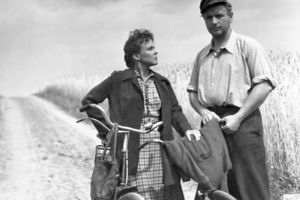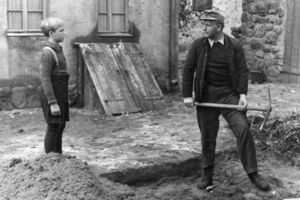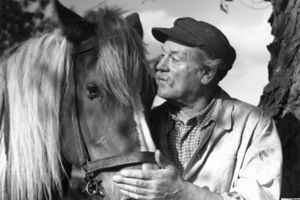Tinko
Director: Herbert Ballmann, 90 Min., Black-White, Feature Film
Deutsche Demokratische Republik (DDR)
DEFA-Studio für Spielfilme, 1956
- Film/Video Format
- 35 mm
- Length in m
- 2477
- English Title
- Tinko
- Premiere Date
- Release Date (for Cinema)
- Literary Source
- Strittmatter, Erwin: "Tinko", Roman
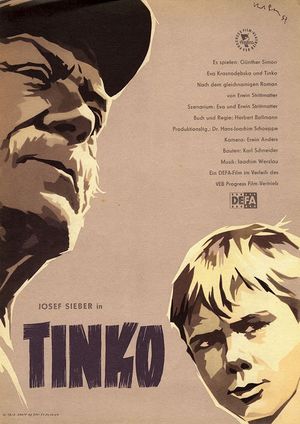
(Dir.: Herbert Ballmann, 1956) Graphic Design: Kurt Geffers
Short Summary (English)
After 1945, Old Kraske, who used to be a cottager, becomes an agricultural worker as result of the land reform.
Yet he still works on his own, flatly refusing to join any collective farming activities. Kimpel is his model: he farms on a large scale. He desperately wants a farmstead like Kimpel's. He wants his adored grandson, Tinko, to take over such a farm one day and that is why Kraske slogs away to the point of exhaustion. Ernst, his son, returns from a prisoner-of-war camp. At first he is overjoyed to be home again although Tinko remains sceptical and withdrawn towards his father. But when Ernst gives his support to the new communal work, father and and son break off relations. Tinko is caught in the middle. His father is still a stranger to him and his grandfather the sole object of his affection. So Tinko stays with Kraske and the "repatriated P.O.W." moves in with Mrs. Clary. But slowly Tinko comes to realise that his father is right and feels compelled to be dose to him. Old Kraske, however; failing to grasp this, drudges on doggedly and dies.
Source: Progress Film-Verleih
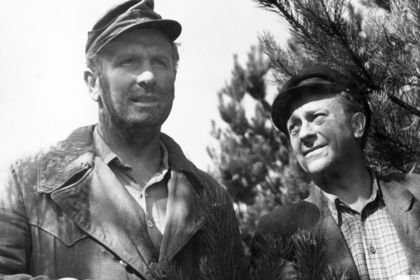
(Dir.: Herbert Ballmann, 1956) Photography: Waltraut Pathenheimer
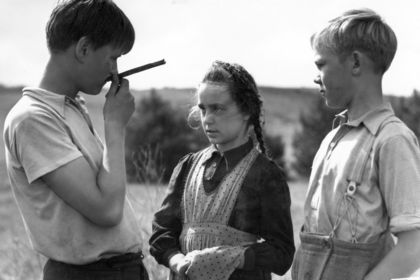
(Dir.: Herbert Ballmann, 1956) Photography: Waltraut Pathenheimer
Film Crew
- Director
- Script
- Scenario
-
- Eva Strittmatter
- Erwin Strittmatter
- Camera
-
- Erwin Anders
- Film Editing
-
- Christa Wernicke
- Cast
-
- Max Reichhoff (Tinko)
- Josef Sieber (Der alte Kraske)
- Lisa Wehn (Die alte Kraskin)
- Günther Simon (Ernst Kraske)
- Ewa Krasnodebska (Frau Clary)
- Helke Pöhler (Stephanie Clary)
- Herbert Kuhlmann (Kimpel-Fritz)
- Paul R. Henker (Kimpel)
- Hans-Peter Minetti (Lehrer Kern)
- Hans Peter Wolf (Murmelauge)
- Hans Hardt-Hardtloff (Paule Wunsch)
- Elisabeth Olivier (Frau Wunsch)
- Johannes Maus (LKW-Fahrer)
- Friedrich Richter (Landarzt)
- C. H. Hendrich (Bürgermeister)
- Wolfgang Dabel (Großer Schuricht)
- Karl-Heinz Schulze (Kleiner Schuricht)
- Hans Megow (Schuricht)
- Hella Göhlich (Alte Berta)
- Franz Pagels (Knecht)
- Heinz Laggies (Jungknecht)
- Herbert Rüdiger (Altknecht)
- Erna Benik (Dürres Mädchen)
- Assistant Director
-
- Ruth Sanden
- Assistant Camera
-
- Günter Haubold
- Production Design
-
- Karl Schneider
- Script Editing
-
- Walter Schmitt
- Music
-
- Joachim Werzlau
- Sound
-
- Horst Schulze
- Musical Performance
-
- DEFA-Sinfonieorchester (Leitung: Adolf Fritz Guhl)
- Costume Design
-
- Rosemarie Wandelt
- Make-Up
-
- Gerhard Petri
- Helga Rudolph
- Props
-
- Willy Poetke
- Production Management
-
- Hans-Joachim Schoeppe
- Unit Production Management
-
- Fritz Delp
- Lothar Klunter
- DEFA Photography
-
- Waltraut Pathenheimer
Short Summary (German)
Der alte Kraske ist durch die Bodenreform vom armen Häusler zum Bauern geworden, doch gegen die Arbeit im Kollektiv sträubt er sich. Sein Vorbild ist Großbauer Kimpel. Enkel Tinko, den er abgöttisch liebt, soll eines Tages einen großen Hof übernehmen können. Für ihn rackert er sich ab. Als Kraskes Sohn Ernst aus der Kriegsgefangenschaft heimkehrt und sich dem neuen, gemeinschaftlichen Arbeiten zuwendet, kommt es zwischen Vater und Sohn zum Bruch. Tinko steht zwischen dem geliebten Großvater und dem ihm fremden Heimkehrer. Er bleibt beim alten Kraske, während Ernst zu der Umsiedlerin Clary zieht. Allmählich jedoch begreift Tinko - auch mithilfe des Neulehrers Kern -, dass sein Vater auf der richtigen Seite steht. Er findet den Weg zu ihm, während sich der uneinsichtige Alte verbissen zu Tode schuftet.
(Quelle: Das zweite Leben der Filmstadt Babelsberg. DEFA-Spielfilme 1946-1992)
Short Summary (Other Languages)
Dopo la riforma agraria il vecchio Kraske è diventato un contadino, che tuttavia si rifiuta di lavorare in squadra. Un giorno sarà suo nipote Tinko, che Kraske ama alla follia e per il quale si da molto da fare, a gestire il suo podere. Quando Ernst, il figlio di Kraske, torna a casa dopo la prigionia e si dedica al lavoro collettivo, padre e figlio si scontrano ferocemente. Tinko, preso fra a due fuochi, resta con l'amato nonno, mentre Ernst si trasferisce da Clary. A poco a poco, però, Tinko comprende che il padre sta dalla parte giusta. Il ragazzo si riavvicina a lui, mentre l'anziano testardo continuerà ad ammazzarsi di lavoro. (Italienisch)

